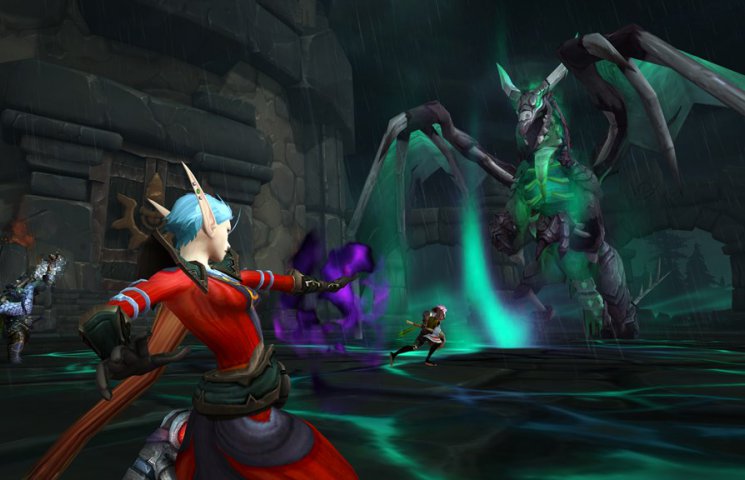Orc this way.
Can you tell the difference between Azeroth and Azkaban? Clan of the Frost Wolf from the Defender Wolf? Elwynn Forest from Elrond's Council? If you've been able to pick out the above references to Harry Potter, Game of Thrones and Lord of the Rings between the references to Warcraft - an MMORPG that's just about to make its cinematic debut - congratulations: you enter this world prepared and have an advantage over the large, no doubt, portion of the audience that director Duncan Jones (Moon, Code of Immortality) and his team are targeting with this latest brand of fantasy. Your knowledge puts you in a much better position when it comes to one of the inescapable challenges of realizing a complex fantasy world with a long tradition, and orienting an untrained audience to it.
While J.K. Rowling, George R.R. Martin and J.R.R. Tolkien were able to create their mythologies over the course of numerous books (and present their screen adaptations over the course of hours of footage), Jones and co. were given the unenviable task of packing the game's chaotic, convoluted multiverse into a self-contained, two-hour-plus epic that, moreover, should lay the groundwork for potential sequels. It's no easy task when citadels with names like Ironforge and Stormwind are turning our thoughts to heavy metal bands from the seventies, rather than helping us focus on a new world like Lord of the Rings.
Despite the inevitable information dump (in short: warring Orcs from the dying world of Draenor find a magical gateway to the peaceful world of Azeroth and confront its human, dwarven and elven inhabitants), the film's emphasis on characters is a breath of fresh air right from the start. Indeed, some may not see what a bold move it was to begin the events by introducing a pair of Orcs - Frost Wolf clan leader Durotan (Toby Kebbell) and Draka, parents-to-be worried about the fate of their clan and newborn child. It's hard to find more, um, human dilemmas. It's not until their journey begins that we are introduced to the real people, the most important of whom is Lothar (Travis Fimmel, known from the Vikings series), the right hand of the gracious King Llane (Dominic Cooper). Naturally, after traces of the unwanted guests are found, a wave of unrest sweeps through the kingdom. Particularly unnerving are those bearing the mark of being touched by the power of "Fel" - a dark (actually, green) magic that warps its users as much as its victims and their surroundings. This is the magic that the ruthless Orc chieftain Gul'dan uses to subjugate the world of Azeroth.
You can mock those weird names all you want (Luke Skywalker or Albus Dumbledore sound so much better!), but it's not the quality of the world's geography or the characterization of the creatures in the film that weigh Warcraft down, it's the sheer multitude of elements presented. We haven't even mentioned the vicious Guardian (i.e. wizard) Medivh (Ben Foster), the wizard's apprentice Khadgar (Ben Schnetzer), the half-orc slave Garon (Paula Patton), and another half-dozen key characters. Attempts to keep everyone in the game and develop meaningful connections between them seem to initially derail the efforts of Jones and co-writer Charles Leavitt. Additional factors, such as too much rumbling, echoing and difficult-to-understand dialogue between Orcs or an unpolished digital panorama of Azeroth that resembles an amusement park rather than an inhabited world, also don't do much to add credibility to the fantastical world.
Slowly but surely, however, Warcraft: The Beginning transforms before our eyes from a computer effects-laden spectacle into an immersive, immersive experience. The rest of the technical spec, as expected, is up to the highest modern standards: the particularly expressive way in which the Orcs move gives us an impressively real sense of their weight, and Game of Thrones soundtrack composer Ramin Djawadi underscores the action with rousing tribal rhythms. Duncan Jones, like Christopher Nolan, has worked his way up from a hard-hitting blockbuster to a decent thriller to a chance to take the helm at the mighty brand that is Warcraft, and he directs the battle scenes with confidence without ever reaching the heights of cinematic artistry reserved for Peter Jackson or James Cameron.
But Jones' real strength and, as you might imagine, his priority, is the personal rather than the technical side of the film. The story - pulled from the 1994 real-time strategy game Warcraft: Orcs & Humans - is essentially straightforward, but the heart of the tale, teeming with broken bonds between parents and children, separated lovers and betrayed friends, beats exceptionally strong. There's even something in the plotline that Tolkien/Jackson noticeably missed (plus or minus the one and only Boromir) - the stakes are raised when one seemingly key character is killed off. As a result, the climatic battles and suspenseful moments feature far more drama than you might expect. The phrase "game over" really does carry some weight here.
Pros
- Character-centered narrative
- Breathtaking special effects (Orcs)
- Bold character direction
Minuses
- Too much information
- Some lackluster casting decisions
Verdict
At a time when too many of the overblown blockbusters resemble impersonal video games, it's heartening to see that a game can be turned into a genuinely emotionally engaging film. Yes, Warcraft: The Beginning suffers from an overcrowded mythology, occasional clumsiness, some questionable casting decisions (particularly Lothar played by Fimmel) and won't achieve the box office result of Avatar, nor will it be showered with awards like Game of Thrones. There is, however, a real sense of striving to capture what has made the Warcraft games so beloved by a hundred million players - whether they play Humans or Orcs - and a desire to capture what makes fantasy such a personal and real experience. Game On.

